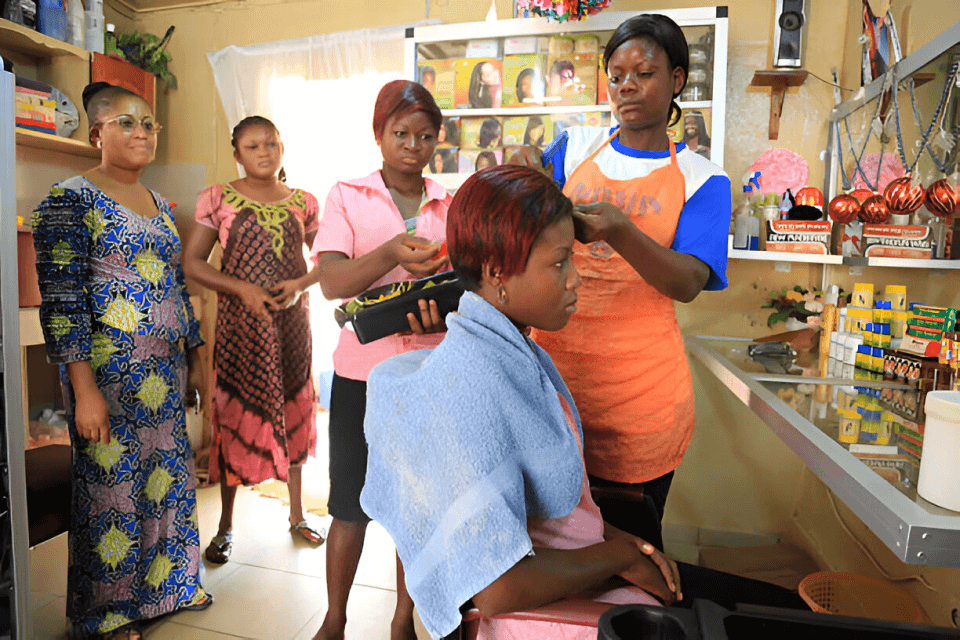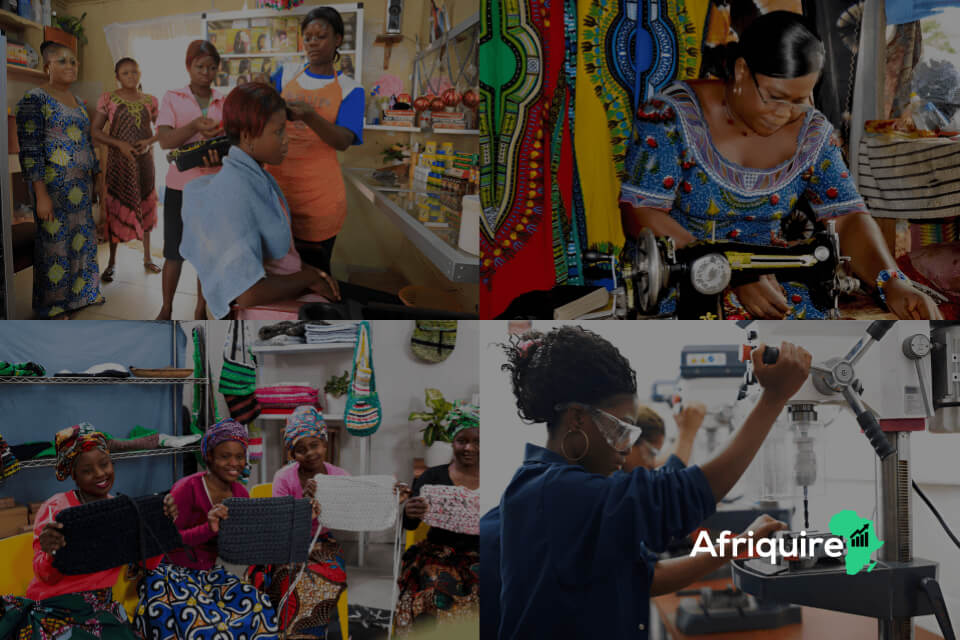- Introduction
- Introduction: The Importance of Empowering Women in Business
- Strengthening Education and Training
- Enhancing Access to Financial Resources
- Creating Supportive Legal and Policy Frameworks
- Building Networks and Mentorship Opportunities
- Leveraging Technology
- Frequently Asked Questions (FAQs)
- Conclusion
Introduction
For a long time, African women have been in commerce, managing markets, and running successful businesses. Yet, their contributions have often gone unnoticed, and many still face barriers to accessing the necessary resources. It is, therefore, important to change that narrative for women in business.
Empowering women in business is not just about equality but tapping into untapped potential. With access to finance, education, mentorship, and networks, African women can become major drivers of economic growth. The question “How to empower women in business in Africa” remains a topic in the mind of everyone who seeks women’s goodwill in Africa. This article will explore how to invest in women-led businesses, creating a more inclusive and prosperous future for all.
Introduction: The Importance of Empowering Women in Business
Empowering women entrepreneurs has a social effect and contributes to economic growth. Women are at the forefront of innovation, job creation, and economic development across Africa. Yet, many face obstacles such as limited access to capital, training, and networks. For Africa to unlock its full economic potential, it is essential to support women in business by providing them with the necessary resources and assistance to succeed. This is not only about creating equality but also about tapping into a powerful force for sustainable development.
- Overview of the Role of Women in Africa’s Economy and their Contributions to Business and Entrepreneurship.
Women are central to Africa’s economy, representing a large portion of the workforce, particularly in agriculture, retail, and small-scale enterprises. Women entrepreneurs make up nearly 60% of micro-businesses across Africa. They create value, innovate, and transform their communities, particularly in rural areas where women-run businesses provide essential services and employment. Women-owned businesses have economic benefits like poverty reduction and job creation. They also contribute to creating safer and greener communities. Empowering women in these roles can bring significant social and economic benefits, uplifting the entire region.
- The Need for Targeted Empowerment Initiatives to Address Barriers Women Face in Business.
Despite their contributions, women in business often face challenges and barriers, such as lack of access to finance, gender biases, and limited business training. These challenges stifle growth and innovation and discourage women with innovative business ideas. Targeted initiatives that provide financial support, mentorship programs, and market access are crucial for empowering African women in business. Collaboration between governments, NGOs, and the private sector is necessary to create ecosystems that allow women entrepreneurs to thrive. By addressing these barriers, Africa can fully benefit from the creativity and determination of its women entrepreneurs.
Strengthening Education and Training
Education is an essential instrument for empowering African women in business. Investing in educating and training girls and women is both a moral commitment and an economic imperative. Educated women are likelier to start and run profitable enterprises, drive economic growth, and improve their communities. Throughout Africa, many programs help women acquire the required skills to prosper in business. Enhancing access to quality education, vocational training, and business literacy and promoting careers in Science, Technology, Engineering, and Mathematics (STEM) can unlock African women’s potential and create a new generation of female entrepreneurs and leaders.
Access to Quality Education
Women and girls should have access to school and high-quality education. Enhancing females’ educational opportunities will raise their chances of success in the business and entrepreneurship worlds. Girls’ access to proper education has been hindered in many parts of Africa by cultural norms, early marriage, and restricted educational opportunities.
Programs that provide scholarships, mentorship, and safe learning environments are essential in overcoming these challenges. Quality education empowers women to pursue entrepreneurship and contribute to the economic development of their communities. When women have access to education, they can assume leadership roles, innovate in business, and drive change. Empowering women in business in Africa through education will ensure a prosperous future for all.
Vocational and Technical Training
Providing women with vocational and technical training equips them with practical skills relevant to local job markets. Programs like Nigeria’s Women in Agribusiness Initiative train women in agriculture using modern farming techniques to improve productivity. Agricultural Technical Vocational Education and Training for Women (ATVET4W) trains and enhances job possibilities, particularly for women in agriculture, through gender-transformative skills. Such hands-on learning gives women the skills to enter high-demand fields. With proper technical training, women can become self-sufficient, increase their incomes, and contribute to their local economies.
- Business and Financial Literacy
Business and financial literacy programs are essential for women entrepreneurs to succeed. Many women in Africa lack access to basic financial services, limiting their ability to start or grow a business. Programs like the Cherie Blair Foundation’s Road to Growth offer business management, budgeting, and financial planning training, giving women the tools to navigate business complexities. These skills help women build sustainable businesses, improve financial security, and make informed decisions in their personal and professional lives.
- Promoting STEM Education
One of the ways to encourage women entrepreneurs in Africa is by encouraging women to pursue careers in Science, Technology, Engineering, and Mathematics (STEM). STEM fields are rapidly growing and offer high-paying, impactful career opportunities. Programs like She Leads Africa and AkiraChix promote women’s involvement in tech and engineering through mentorship, scholarships, and coding boot camps. Promoting STEM education enables African women to enter emerging sectors like technology, renewable energy, and innovation, driving economic growth across the continent.

Enhancing Access to Financial Resources
Empowering women in business is key to driving Africa’s economic growth, but limited access to financial resources is a major barrier. Women entrepreneurs, especially in rural areas, often struggle to secure funding, making launching or expanding their ventures difficult. Improving financial access and providing financial education can unlock the potential of women-led businesses.
Microfinance and Small Loans
For many women entrepreneurs in Africa, microfinance institutions are the lifeline that helps them start or grow their businesses. Microfinance institutions offer small, affordable loans to women who may not have access to traditional banking services. These institutions have played a significant role in empowering women, especially in underserved communities. With lower interest rates and flexible repayment plans, microfinance offers women the financial boost they need to launch ventures in agriculture, retail, and craft-making.
Moreover, microfinance programs often provide training and mentorship to ensure women use their loans effectively. This dual approach of providing capital and knowledge can be a game-changer for women entrepreneurs, enabling them to thrive in their respective industries.
Investment and Venture Capital
While microfinance is essential, there is a growing need for investment and venture capital to help scale women-led businesses. Women entrepreneurs often face challenges in securing venture capital due to biases or a lack of access to investor networks. This is where angel investors and venture capitalists come in. By targeting women-led startups with high growth potential, these investors support individual businesses and contribute to women’s economic empowerment across Africa.
Increased investment in women-led ventures could help level the playing field, enabling more women to expand into industries traditionally dominated by men, like tech and manufacturing. Organizations such as the Africa Women Innovation and Entrepreneurship Forum (AWIEF) are connecting women entrepreneurs with venture capital, opening doors for future business leaders.
Government Grants and Subsidies
African governments increasingly recognize the importance of empowering women entrepreneurs, offering grants and subsidies to support their ventures. Governments have introduced specific funding programs in several African countries aimed at women. For instance, South Africa’s Women Empowerment Fund provides grants for women in sectors such as agriculture, manufacturing, and technology.
These government programs often have additional benefits, such as tax breaks or subsidies for women-owned businesses. By leveraging these opportunities, women entrepreneurs can access much-needed capital to grow their businesses without the burden of high-interest loans.
- Financial Education
Empowering women in business goes beyond just giving them access to financial resources. It is also about ensuring they understand how to navigate the financial landscape. Financial education is crucial in helping women entrepreneurs make informed decisions about loans and investments and manage their finances. Programs offering workshops, mentorship, and training equip women with the knowledge they need to access funding, build credit, and grow their businesses sustainably.
Organizations like She Leads Africa are working to provide women with the skills to understand the various financial products and manage their businesses effectively. By improving financial literacy, women are better positioned to make strategic financial decisions and avoid the pitfalls of debt.
Africa can unlock the potential of millions of women entrepreneurs by improving access to funding and equipping women with the knowledge to succeed. This drives economic growth, enhances community well-being, and creates a more equitable society. Empower African women in business, and you secure the continent’s future.

Creating Supportive Legal and Policy Frameworks
Empowering women in business in Africa is vital for economic growth and social development. A strong legal and policy framework that promotes gender equality is essential for unlocking the full potential of women entrepreneurs. As a result of advocating for comprehensive laws and supportive initiatives, we can create an environment where women thrive in business.
Gender Equality Legislation
Promoting laws that ensure gender equality in business ownership and workplace rights is key to empowering women entrepreneurs. Legislation should guarantee women equal access to credit, resources, and opportunities, breaking down the barriers historically limiting their economic participation. Laws mandating equal pay for equal work, prohibiting gender discrimination, and providing maternity leave are critical. Embedding gender equality in legal frameworks uplifts women and stimulates overall economic growth.
Supportive Government Policies
Governments can implement policies that support women entrepreneurs, such as tax incentives for female-led businesses and procurement programs prioritizing women-owned enterprises. Tax breaks for businesses that hire women or support female entrepreneurship boost women’s participation in the workforce. Additionally, government contracts awarded to women-owned businesses help create a more inclusive economy, driving innovation and job creation.
Addressing Legal Barriers
Reforming laws that hinder women’s business activities is essential for empowerment. Property rights and inheritance laws often restrict women’s ability to own or operate businesses. In some regions, cultural norms and outdated legal frameworks prevent women from using property as collateral for loans. Reforms granting women equal property and inheritance rights can unlock countless opportunities. Legal reforms should be accompanied by awareness campaigns to educate communities on the importance of gender equality in business.
Encouraging Public-Private Partnerships
Public-private partnerships (PPPs) are vital for sustainable change. Collaborations between the private sector and governments allow them to gather their unique resources to develop programs that address the needs of women entrepreneurs. PPPs can create mentorship programs, mobilize funding for women-led startups, create and establish training initiatives. By leveraging both sectors’ strengths, PPPs can significantly impact women’s business empowerment, promoting an inclusive economic landscape.

Building Networks and Mentorship Opportunities
Supporting African women in business involves more than providing financial aid; it requires building strong networks, mentorship programs, and access to resources that foster collaboration and growth. Developing an ecosystem that enables women entrepreneurs to connect, learn, and succeed is key to driving economic progress across the continent. Here are key strategies for building these critical networks:
Establishing Women’s Business Networks
Creating platforms where women entrepreneurs can connect, share resources, and support each other is essential for their success. Women’s business networks provide a space to share experiences, challenges, and opportunities. These networks can operate locally, regionally, or nationally, facilitating collaboration among members. Organizations like African Women in Business help create such platforms, offering mentorship, funding opportunities, and business resources. By fostering these relationships, networks enhance visibility and encourage collective problem-solving, empowering women to take control of their business futures.
Mentorship Programs
Creating mentorship programs that pair experienced businesswomen with aspiring entrepreneurs is crucial for empowering African women in business. Mentorship provides invaluable guidance for navigating the complexities of running a business. Programs like the Women Entrepreneurs Network connect seasoned professionals with young entrepreneurs seeking strategy, marketing, and finance advice. These mentorships boost confidence and equip aspiring businesswomen with practical skills. Such connections ensure that the knowledge and experience of established women are passed down, creating a supportive entrepreneurial ecosystem.
Workshops and Conferences
Organizing events that promote networking and knowledge-sharing is vital for empowering women. Workshops and conferences allow women to learn from industry leaders, share their stories, and connect with potential partners or investors. The SheTrades Global Conference, for example, brings together female entrepreneurs from diverse industries, allowing them to display their firms and make vital connections with possible buyers, investors, and partners. These events often include panels, workshops, and training sessions that provide attendees with the tools they need to thrive while encouraging collaboration among women entrepreneurs.
Leveraging Technology
Online platforms can link women entrepreneurs from different regions, enhancing networking and access to resources and training. Platforms like LinkedIn and Facebook Groups allow women to network beyond geographical borders and share their knowledge and experiences with other businesses. Women Who Code is a technology-based initiative that provides coding seminars and job possibilities for women in the computer industry. E-learning platforms also offer business management, finance, and marketing training, allowing women to develop valuable business skills. Technology empowers women to overcome hurdles and connect with global networks that support their business goals.
Frequently Asked Questions (FAQs)
1. Why is it important to empower women in business in Africa?
Empowering women drives economic growth and sparks innovation across the continent.
2. What prevents African women from being successful entrepreneurs?
Barriers include limited access to finance, education, and social support.
3. How can access to finance for women entrepreneurs be improved?
We can create women-specific financial products and offer microloans through banks, microfinance institutions, and NGOs.
4. Why is networking important for women in business?
Networking opens doors to partnerships, funding, and growth opportunities.
5. How do technology and digital tools help?
They provide global reach and streamline business operations.
Conclusion
Empowering women in business is critical to unlocking Africa’s full economic potential. We need targeted support to break down existing barriers, from financial access to education and mentorship programs, enabling women to thrive in competitive markets.
Are we doing enough to challenge societal norms and create inclusive policies that support African women in business? We can only foster a future where women-led businesses flourish, driving economic stability and innovation across Africa through sustained efforts and leveraging technology.



